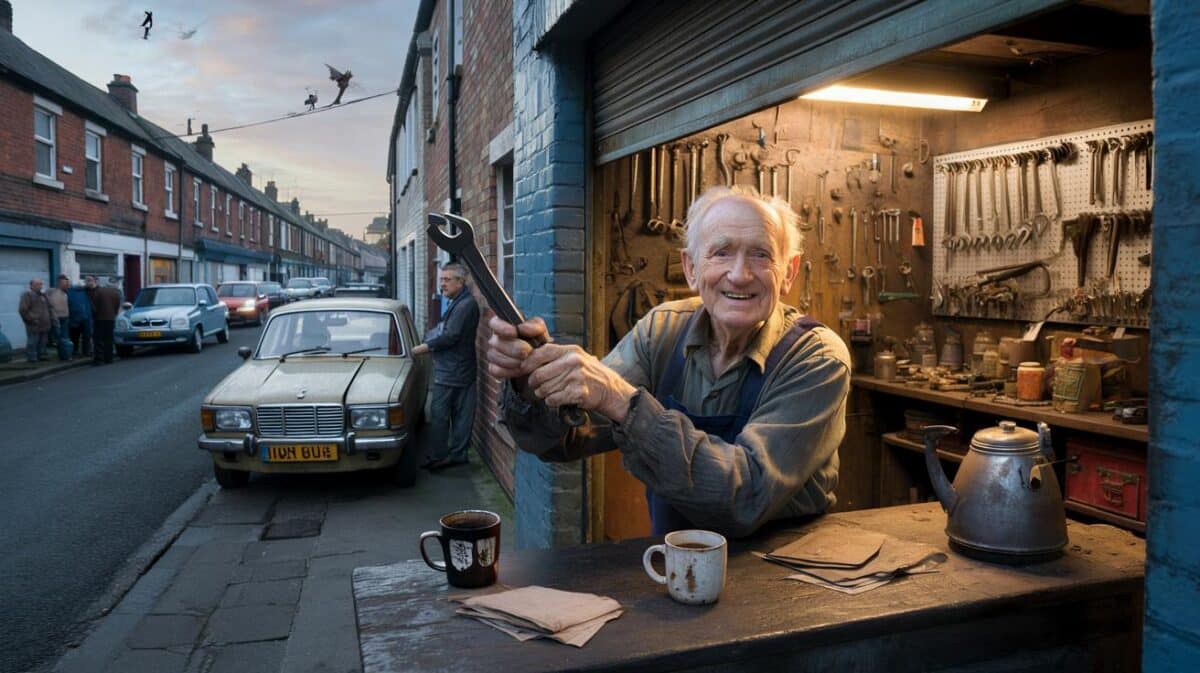Real life is messier. The smartest people I meet don’t have perfect routines, they have small, human habits that make space for their feelings before the world starts shouting. You can spot them by the way they enter a kitchen, the way they touch their phone, the way they take one quiet breath before the first ping. Their mornings reveal something deeper than productivity. They reveal emotional intelligence at work.
The kettle rattled as the flat woke up, and a grey London dawn pressed against the window. A man in a creased hoodie swiped his phone, hesitated, then flipped it face down, eyes on the steam. Across the table, his partner scribbled a single line in a dog-eared notebook: “Tired, hopeful.” We’ve all had that moment when the day is pulling at your sleeve, yet a thin slice of calm holds its ground. He looked out, then in. It looked ordinary, yet it wasn’t.
They start by checking the weather inside
People with high emotional intelligence don’t sprint into the morning; they tune in. Before the headlines and the inbox, they clock the inner forecast: Is it anxious drizzle, sunny curiosity, or a heavy low-pressure system of fatigue. Two sentences of awareness can change the map of a day. They ask, out loud or on paper, “What am I feeling, and what do I need?” It’s not performative. It’s practical.
Take the commuter who pauses at the bus stop, hand wrapped round a coffee cup. Three breaths. One word. One choice. The word might be “fragile”. The choice might be “slow lane till 9”. Research suggests that when we label a feeling, the brain’s threat response quietens, and our prefrontal cortex gets a little more room to lead. That tiny ritual stops a mood from becoming a master.
This is not self-absorption, it’s self-separation. By noticing “I feel stressed” rather than “I am stressed”, you create daylight between you and the emotion. That daylight lets you plan the first hour with kinder expectations, and set the tone for interactions. You choose the first domino, not the other way round. Emotional intelligence isn’t loud in the morning. It’s precise.
They set gentle fences for the day
There’s a small choreography to it: a sip of water, a glance out of the window, then a two-minute pause before touching any apps. *It starts before your inbox opens.* Many quietly use a “one-intention rule”: they state one thing the morning is for—calm handover with the kids, rebuilding focus, or drafting three ugly lines of a report. Everything else can queue.
They also design friction in the right places. News and social icons sit on a second screen; the alarm lives on a non-social app; headphones out of reach. A simple “doorframe cue” helps too—when they cross the kitchen threshold, they ask, “What am I bringing into this room?” Soyons honnêtes: personne ne fait vraiment ça tous les jours. Let’s be honest: nobody really does that every day. Still, once or twice a week is enough to shift the day’s gravity.
Repairing tiny relationships is another fence. A 30‑second “about yesterday” text at 7:45 removes the splinter before it throbs at 11. That’s EQ in motion: reduce future friction by tending to small tears early.
“Morning boundaries aren’t walls,” a leadership coach told me. “They’re handrails. They keep you steady so you can meet other people where they are.”
- Name it to tame it: write one feeling word on a sticky note and pocket it till lunch.
- Emotional weather report: say “Inside today: cloudy with sunny spells” while you stir your tea.
- Run a second‑sip check: after your second sip of coffee, decide the day’s first 20 minutes on purpose.
- Micro-repair: send one sentence that reduces tension with a colleague or partner.
- Move your body for 90 seconds—stairs, stretches, doorway push-ups—to tell your nervous system it’s safe to start.
What these rituals whisper about you
Morning habits with emotional intelligence aren’t glamorous. They whisper, “I notice, I choose, I care.” That awareness tends to ripple. You forgive yourself for a slow brain and protect your best hour for work that actually matters. You walk into conversations not to win but to understand, because your own feelings already had their say at 7:12.
This isn’t a “5am club” sermon. It’s craft. Five minutes of honest check-in can reveal your limits for the day, which is what makes your generosity credible. People trust those who regulate themselves, not those who pretend the tide doesn’t move. The morning becomes less of a sprint and more of a launch, even on the days when the rocket coughs and sputters.
You might not call any of this a ritual. You might call it “how I stay human before meetings”. That language matters less than the signal it sends: you are willing to meet reality without flinching, and to treat the first hour as a hinge the rest of the day swings on. That’s a strategic tenderness. And it shows.
Small choices that reveal big EQ
Start with light. People with steady emotional ballast often seek daylight within minutes—curtains open, balcony step, front door ajar. It’s not biohacking; it’s a cue to wake your senses before your screen. They also hydrate early, sometimes with a pinch of salt or a slice of lemon, because bodies that feel better behave better in meetings. Little hinges. Big doors.
Another tell: they rethink the first yes. Instead of saying “yes” to everything the night before, they review the calendar for one silent deletion—a nonessential call moved, a task trimmed by half. They do this kindly, not guiltily, because protecting bandwidth is how they protect people. If you’re reading this with a baby monitor crackling or on a night shift, your version might be a three-minute stretch under fluorescent light. Same principle. Different canvas.
They also prime empathy. A quick glance at a colleague’s time zone before sending that 7am request. A note by the kettle: “Tom’s big pitch today—ask, don’t dump.” They leave one clean plate in the sink for later them, and that future kindness spills outward.
“EQ shows up where nobody is watching,” said a therapist who works with emergency doctors. “The morning is where you rehearse the day you want to live.”
- Set one “stop at” time, even if it’s soft, and put it in your calendar title.
- Pre-write the first sentence of the day’s hard email so inertia doesn’t win.
- Two-minute tidy of your visual field—clear the chair, stack the mail—to lower background noise.
- Check your bias: name one assumption you’re making about someone on your diary today.
- Gentle dose of novelty—a new walk route or song—to wake curiosity, the friendliest regulator.
Morning habits are the quiet place where self-respect meets social grace. It’s less “hacks” and more “signals”. Signals that you value your nervous system, that you know your edges, that you won’t export your unprocessed mood onto other people. The real flex is not waking at dawn; it’s waking to yourself. Share one line with a friend tomorrow—how you felt, what you chose—and watch how fast a conversation moves from logistics to life. Your day will tell on you anyway. Let it say something you meant.
| Key points | Detail | Interest for the reader |
|---|---|---|
| Inner check-in | One word for your feeling, one small need, one deliberate choice | Fast, portable way to steer the day’s tone |
| Design gentle friction | Delay phone, move icons, “one intention” before opening apps | Protects focus without rigid rules |
| Repair and prime empathy | 30-second micro-repair, little reminders about others’ context | Makes relationships smoother by midday |
FAQ :
- What exactly counts as “emotional intelligence” in the morning?Noticing your state, naming it, and making choices that reduce downstream friction—both for you and for others.
- How long should a morning check-in take?Anywhere from 30 seconds to five minutes. Depth beats length.
- Do I need to wake up earlier to do this?No. Borrow time from scrolling, not from sleep.
- What if my mornings are chaotic with kids or shifts?Shrink the ritual: one breath at the doorframe, one word on a note, one choice for the next 20 minutes.
- Can an app help, or is that just another screen?Apps can cue habits, but paper or a fridge note works as well. The tool matters less than the attention you bring.









